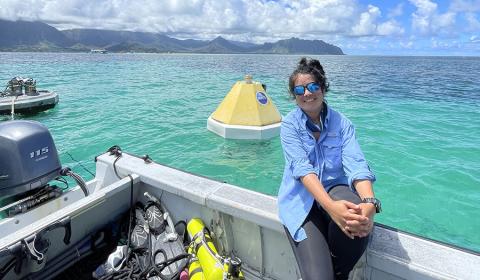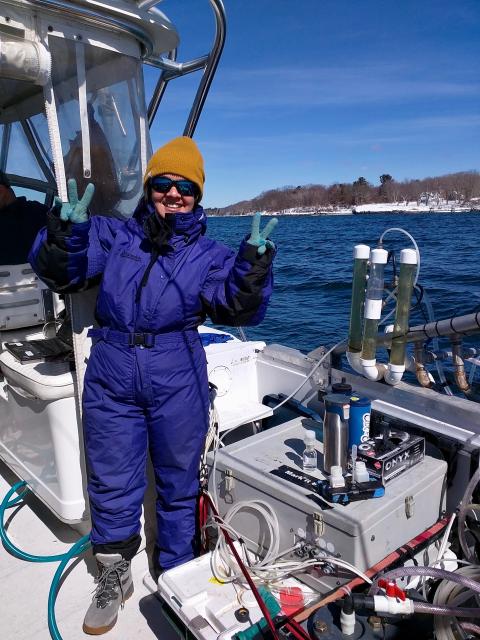
Alumni Spotlight Q & A:
Where are you from, Melissa?
Originally from Comerio, Puerto Rico.
What did you study and who was your adviser?
Oceanography, Ph.D. 2020. I studied the mechanisms and temporal variability of biogeochemical cycles on carbonate chemistry and ocean acidification at two Atlantic coral reefs using observational and modeling approaches. My adviser was Dr. Joseph (Joe) E. Salisbury.
Why did you choose UNH?
I heard about UNH during a visit that a former student (Dr. Sylvia Rodriguez Abudo) did to the University of Puerto Rico-Mayaguez. She put UNH under my radar for potential programs. I found Joe Salisbury was working there and I knew his work with Ocean Acidification and his previous research collaborations with UPR-M. I thought it was the perfect combination of research and connection to Puerto Rico where I studied and grew up.
What were your favorite courses and why? Which professors had the greatest impact on you?
I really enjoyed the class of Aquatic Geochemistry with Dr. Linda Kalnejais and the Time Series class with Dr. Tom Lippmann. I think that the professor that had the greatest impact was Dr. Diane Foster. Even though I never had class with her, I saw how she managed the lab and her students, how she approached different academic and research questions, and how supportive she is with her students. I learned a great deal from her outside of the classroom.
What was student life like? What did you think of the campus and extracurricular activities?
I lived off campus around the Portsmouth and Kittery area. During my first year I explored the athletics, and health & wellness services. I rented equipment from the Recreational Program to do my first Cross Country Skiing outing at the trails in Madbury/Durham. I didn’t have friends yet. I remember I watched YouTube videos and went for it, imitating what others did. I enjoyed the crisp air, but never got really good at skiing. The activity I enjoyed the most was hiking!
I also participated in some of the graduate school activities with Cari Moorhead. I enjoyed being a member of the UNH Science Communication Academy (I think my cohort was the first) and part of the Advisory Board of the UNH Underrepresented Graduate Students with Dovev Levine.
I worked closely with local teachers and community leaders on annual activities where I spoke in their classes about my area of expertise and cultural background. A team of UNH graduate students and I created the 'Students helping Estudiantes’ campaign to raise funds after Hurricane Maria devastated the Caribbean and helped support two displaced students and two professors from the closed UPR campus to continue their studies and work at UNH without interruption.
What was the biggest transitional issue you faced when you started at UNH?
I am a first-generation student. It was a big step for me and family. I moved to a new place with a different language, weather, and with no friends or family around. I also moved alone – I thought it was going to be easy peasy.
At first I felt kind of lonely and different from everyone else. My English was rusty and having group conversations or participating in class was hard. I think I adapted fairly quickly. My GRE scores were low (I have never been good with standardized tests) and looking back, I think I experienced Imposter Syndrome, which I later learned about. I found myself thinking I was not good enough to be there. But found a vibrant community, contributed to my research field and passed all my classes, I had a positive experience; I didn’t think about the GRE again…
How is UNH addressing the social cause you are most passionate about?

The diversity issues, underrepresentation of women in STEM, and harassment issues were not really brought to my attention until I got to UNH. I learned about these when I started my PhD and I was able to identify myself in some of the situations that I was learning about. I became passionate about them and joined the UNH Women in Science group. I was also a member of the Advisory Board for Underrepresented Graduate Students at UNH, and was appointed as a member of the Ad Hoc Committee of the UNH School of Marine Sciences and Ocean Engineering Diversity, Equity and Inclusion after George Floyd’s murder.
UNH was also very supportive after Hurricane Maria devastated the Caribbean. Thanks to the graduate school and SMSOE that hosted and supported two displaced students and two professors from the closed UPR campus.
What is your current position and what does your day-to-day work look like? Why is your work important?
Currently, I am a Postdoctoral Researcher at the University of Hawai’i at Mānoa. I work on an NSF project that aims to develop a high-frequency (<60 s) autonomous dual sensor to measure seawater total alkalinity and pH to evaluate metabolic processes in Hawaiian coral reef areas from in situ time series (mooring) and process study (drifters) data. I also analyze data from different CO2 buoys in the Atlantic and Pacific on the first comparative study that aims to provide a more holistic view of how coral reef ecosystems are being affected by ocean acidification.
What are your future career plans?
I would like to go back to Puerto Rico, but opportunities at the University are limited. There are other opportunities outside academia I would like to explore. I love being a researcher and providing opportunities for underrepresented students in the lab and field.
How did UNH contribute to your career and where you are now? Looking back on your time spent as a UNH grad student, what are some of your best memories?
UNH gave me the opportunity to teach as a Teacher Assistant for ‘Intro to Oceanography’ (78 students), I was the Co-PI (unofficially) on different projects with my former advisor. I really enjoyed the SMSOE Symposium where I presented my work to my peers. UNH also provided me the tools and support on my application to the Ford Foundation dissertation fellowship. This fellowship helped me during my last year of my dissertation and boosted my CV.
My advisor, Joe Salisbury and I had the opportunity to work on different research cruises such as NOAA's East Coast OA monitoring cruise and the NASA-Korean Joint Field Campaign for Ocean Color. I also had the opportunity to work at Bigelow Laboratory for Ocean Sciences, on laboratory experiments that focus on understanding the use of macroalgae (e.g., kelp) as a potential remediation strategy against ocean acidification. These collaborations further expanded my research, collaborations, and contributed to my oceanography career greatly.
"I hope my work in ocean acidification helps push the much-needed action from managers and leaders to help fight climate change."
Any advice for undergrads/grad students who are conducting research?
Think big picture – the climate/environmental issues affect all of us. Find your passion in research and don’t forget to enjoy nature!
What was something you would have changed about your graduate research experience? What can be improved so that other students conducting research have an improved experience?
I would take advantage of all the UNH services, courses, workshops, fellowship writing support, and help that are offered. I never took the ‘Grant Writing’ course and I regret this. More practice writing and communicating your science is super important nowadays. UNH provides science communication tools – you should take them and practice them. Build your social media science profile and disseminate your results in a simple and effective way. This is the new networking way. The science community is small - build strong relationships with your peers – they become your go-to colleagues in future projects.
What makes you proud to be affiliated with UNH?
UNH research facilities, professors/researchers, and graduate school community.
What impact do you hope your work has on future generations?
I hope my work inspires other students that think that they cannot do work related to tropical areas in a place like NH. I hope my work in ocean acidification helps push the much-needed action from managers and leaders to help fight climate change. I hope my work provides the knowledge needed to understand that if we don’t reduce CO2 emissions and develop the strategies to sequester CO2 from the air and ocean, future generations may never get to enjoy nature the way I did.
Can we find you on social media?
Yes, you can find me on Twitter.
Are you or is someone you know an alum who conducted research with us? Want to be featured in an upcoming Alumni Spotlight? We'd love to connect! Please email Rebecca.Irelan@unh.edu with details.